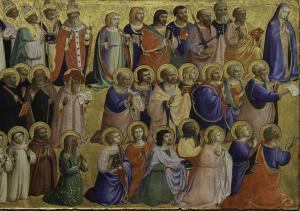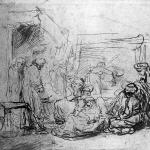
At Pentecost, the Holy Spirit entered the world in a new way. It is called the Holy Spirit because it sanctifies those it touches. It brings the kingdom of God with it, giving those who embrace it their share of the eschatological glory, the glory of the light of Tabor. Everyone is called to receive the Spirit. Everyone is called to the kingdom of God. Everyone is called to be holy. Everyone is meant to be, and everyone can be, a saint. It is for this reason that the celebration of All Saints fittingly follows the Sunday of Pentecost in the Byzantine tradition, for on it we contemplate and honor the work of Spirit as we honor the saints. With God, nothing is lost, nothing is forgotten. While we do not know all the saints ourselves, as many of them have lived lives hidden from the annals of history, they are known and cherished by God. They are honored by us today, so that even if we do not know them, we have our own way to make sure they are not forgotten so that like God, we can cherish them in our hearts, even if we do not know their names.
The saints form a community and are bonded together by love. Salvation is not individualistic, it is communal, as humanity is meant to be one in love even as the persons of the Trinity is one in love. The Spirit wants to unite all of us and make sure we are one so that we can reflect the unity of God in and through our love. No one is left of the Spirit’s mission. Everyone in the world, everyone is history is included in it. No one is left out, for no one has been predestined for perdition.
Obviously, sanctity is not easy. There will be trials and tribulations. We will have to deal with and experience the consequences of our actions, actions which often bring much suffering to ourselves and those around us. But, thanks to the Spirit, we do not have to deal with the ramifications of our actions all alone. The Spirit brings us grace, and if we embrace it, grace will lessen the harm which we have done and so reduce the suffering which we create for ourselves. But to embrace that grace, we must recognize the error of our ways, so that then we will be ready to reform ourselves and cooperate with the Spirit as it purifies us, even if it means we must discipline ourselves and let ourselves be tried and tested before we can fully join in with the reign of Christ. If we do so, we will receive a far greater good than we could have ever imagined, as the author of the Book of Wisdom explained:
Having been disciplined a little, they will receive great good, because God tested them and found them worthy of himself; like gold in the furnace he tried them, and like a sacrificial burnt offering he accepted them. In the time of their visitation they will shine forth, and will run like sparks through the stubble. They will govern nations and rule over peoples, and the Lord will reign over them for ever (Wis. 3:5-8 RSV).
We must not think of suffering as a good which we should embrace, but rather, that good can come out of it, as it can come out of any and every evil. All evil must be denounced. This does not mean we must deny the little good which exists in all that evil, the little good which can still be found in the midst of such suffering, for we must realize evil cannot entirely destroy or eliminate the good. Thus, there will be some good in the midst of all the pain and sorrow which, when found, can be used to transform the suffering and evil. The more we embrace that good, the more we can build upon it and establish something great, despite all the suffering and evil around it. As we build upon that good, we will find the evil itself will be in decline, until at last, it will be gone and all that is left is the good which we have established.
We should not seek to needlessly suffer and think by suffering, we will be made great. Rather, the point is that God can work with us in and through such suffering, finding some good in it, and so find a way to turn the evil we experience around and establish some greater good to replace it. This is how and why nothing in our life is without worth or value. Nothing from our life will be lost but will help form who and what we are to become in eternity. Those who are sanctified by the Spirit, those who have been blessed by God, will not forget what they have gone through, will not see the evil which they suffered as anything but evil, but they will see that in and through all such suffering, they were not broken, they were not destroyed but made stronger. For it was in the midst of their lowness God came to them and showed them love, comforting them, giving them the space they need to find themselves and to achieve greatness. Thus, nothing is forgotten, and all the trials and tribulations of life will be the basis by which we receive a plentitude of grace:
Then Peter said in reply, “Lo, we have left everything and followed you. What then shall we have?” Jesus said to them, “Truly, I say to you, in the new world, when the Son of man shall sit on his glorious throne, you who have followed me will also sit on twelve thrones, judging the twelve tribes of Israel. And every one who has left houses or brothers or sisters or father or mother or children or lands, for my name’s sake, will receive a hundredfold, and inherit eternal life. But many that are first will be last, and the last first” (Matt. 19:27-30 RSV).
Nothing is lost. Nothing is forgotten. Our pains and sorrows are not forgotten, but remembered by the incarnate one who, out of love, came among us and suffered with us and for us. Through his solidarity with us, Jesus shows us that our pain and sorrow, our suffering in life, does not mean God has abandoned us. When we cry, why have you forsaken me, we find that Jesus cries that cry with us, showing that we have not really been forsaken. God is the God of the outcast, the unjustly scorned, indeed, of those who sorrow. The pathos of God is with them; they are embraced by God in Christ, and so in and through that embrace, they are able to unite with Christ and be lifted up and made great. Yes, trials and tribulations will make them stronger; what they experience will purify them, but this is possible only because in the midst of all that sorrow, in the midst of all their trials and tribulations, God is there with grace. The lives of the saints show us this time and time again; it is not that they were perfect in all they said and did that were saints (for most were not); rather, it is because, when touched by the love of God, they were able to embrace that love and transcend themselves and become members of the kingdom of God. And so, in that transcendence, they were also able to transcend all their pain and sorrow and experience the eschatological glory which brought them true peace and comfort:
But the souls of the righteous are in the hand of God, and no torment will ever touch them. In the eyes of the foolish they seemed to have died, and their departure was thought to be an affliction, and their going from us to be their destruction; but they are at peace (Wis. 3:1-3 RSV).
Everyone is called to share in that glory, to share in with that peace. If we open ourselves up to the spiritual world and its reality, we will realize that all around us are those who came before us, those who were touched by the Spirit and were made into saints. They have become the cloud of witnesses who show us the way:
Therefore, since we are surrounded by so great a cloud of witnesses, let us also lay aside every weight, and sin which clings so closely, and let us run with perseverance the race that is set before us, looking to Jesus the pioneer and perfecter of our faith, who for the joy that was set before him endured the cross, despising the shame, and is seated at the right hand of the throne of God (Heb. 12:1-2 RSV).
Nothing should be lost. History is important. Everyone should bring what they are into the kingdom of God. Everyone is called to glory. Whenever we partake of the feast of All Saints, we should not only remember not only those who came before us, but we should also contemplate the way we are called to join in with the them, so that when our time comes, we can be with them and experience the feast, not just for one day, but for eternity, thanks to the work of the Spirit in the world.
Stay in touch! Like A Little Bit of Nothing on Facebook.
If you liked what you read, please consider sharing it with your friends and family!












